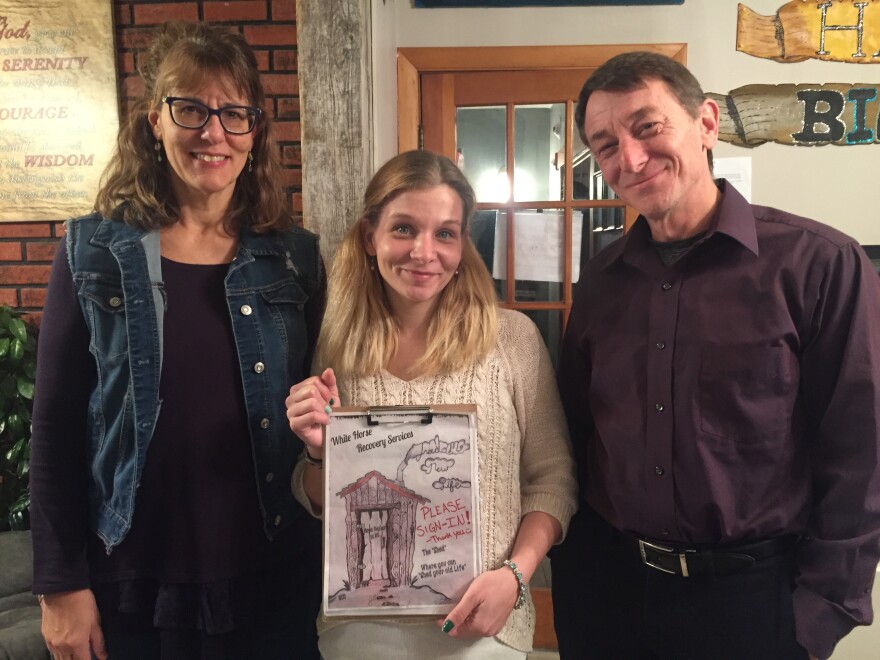When you think about New Hampshire’s opioid crisis, Manchester and Nashua tend to come to mind. That’s because they’ve been getting most of the attention…and resources.
But as NHPR’s Paige Sutherland reports, smaller towns in the Northern part of the state are battling this crisis too…and struggling to do so.
If you're driving on Route 16B in Ossipee you might pass this family-style house alongside the road, right off the highway. It's nothing fancy – wood paneling, red trim and … a tiny sign hidden on the side of the house with “The Shed” in small black print.
"The Shed" is the only drug recovery center of its kind in all of Carroll County. It opened last spring in Ossipee with the help of Eric Moran. Moran now manages the place and coined the name too. He said – this is where you can ‘shed’ your old life of addiction.

Inside it has this community, almost lounge feeling to it: hand-me down sofas and chairs, a few computers lined up along the wall, and the most important part of the house … the coffee bar.
“So my recovery started because I drink a lot of coffee – so the coffee bar was the very first thing that began in here," Moran said while giving a tour.
Moran has been sober for four years. But when he was trying to get help for his addiction, he says, there wasn’t much in the area.
“I had no trouble going to meetings but that is all we had was AA. Now people can come here if people have nothing to do all day, they can come here, we can give them small tasks, we can just hang out, play games – they have a safe place and that’s what this is.”
Moran says, for people in recovery, hanging out with others who are sober – keeps them sober too.
Kris Farrell is sitting in one of the swivel sofa chairs chatting with another guest. She’s been coming here for the past year.
“This is it. This is what you have here," Farrell said.
“So," NHPR asked, "if this wasn’t here?”
“You would have absolutely nothing – no place to go, no place to begin or try to start.”

People are grateful “The Shed” is there. But it’s just one piece of the puzzle.
In all of Carroll County, there are limited treatment options for substance abuse. Few outpatient services, a single inpatient treatment facility, one sober house only for women and just a handful of Licensed Drug and Alcohol Counselors.
The problem is severe.
In 2016, Carroll County had the third-highest number of overdose deaths per capita in the state.
Police chiefs in the county say drug-related offenses are taking up nearly 90 percent of their service calls.
Many of the smaller towns don’t even have police departments. Others are understaffed.
Sandwich Police Chief Doug Wyman says he wants to help but there just aren’t enough options in the county.

“I was on the phone for almost three hours trying to get this kid help and finally I just said to his grandmother, ‘you have to take him to Manchester because I can’t get anyone on the phone.’ And it's extremely frustrating when you are trying to help someone and someone genuinely wants the help.”
The county gets a fraction of the treatment funding that big cities like Manchester and Nashua receive. Last year they got 10 times fewer federal and state dollars than Manchester alone.
Yvonne Meisner of Ossipee experienced this shortage of resources a few years ago when her son began his heroin addiction. She ended up having to send him to Massachusetts to get help.
“It’s about time to spread it up here a little bit – you don’t need all that money all the time. I get it - it is always going to the same old because it’s the big and it’s the city, yes, but let’s really get a portion up here.”

But Back at The Shed – Eric Moran isn’t counting on more public money. The center wants to be self-sustaining. The shop next door sells antiques to help pay the bills and soon they’ll be making their own business cards to raise money. They even now have the printer. One day – they’re hoping to be a place people can turn to at all hours.
“Yeah – do we wish we could do more? Yep. But are we going to go above and beyond and at least do as much as we can? That’s really all we can do, is as much as we can.”
The organization also just got a donation to offer temporary housing for those in the area. They plan to open up this summer.







